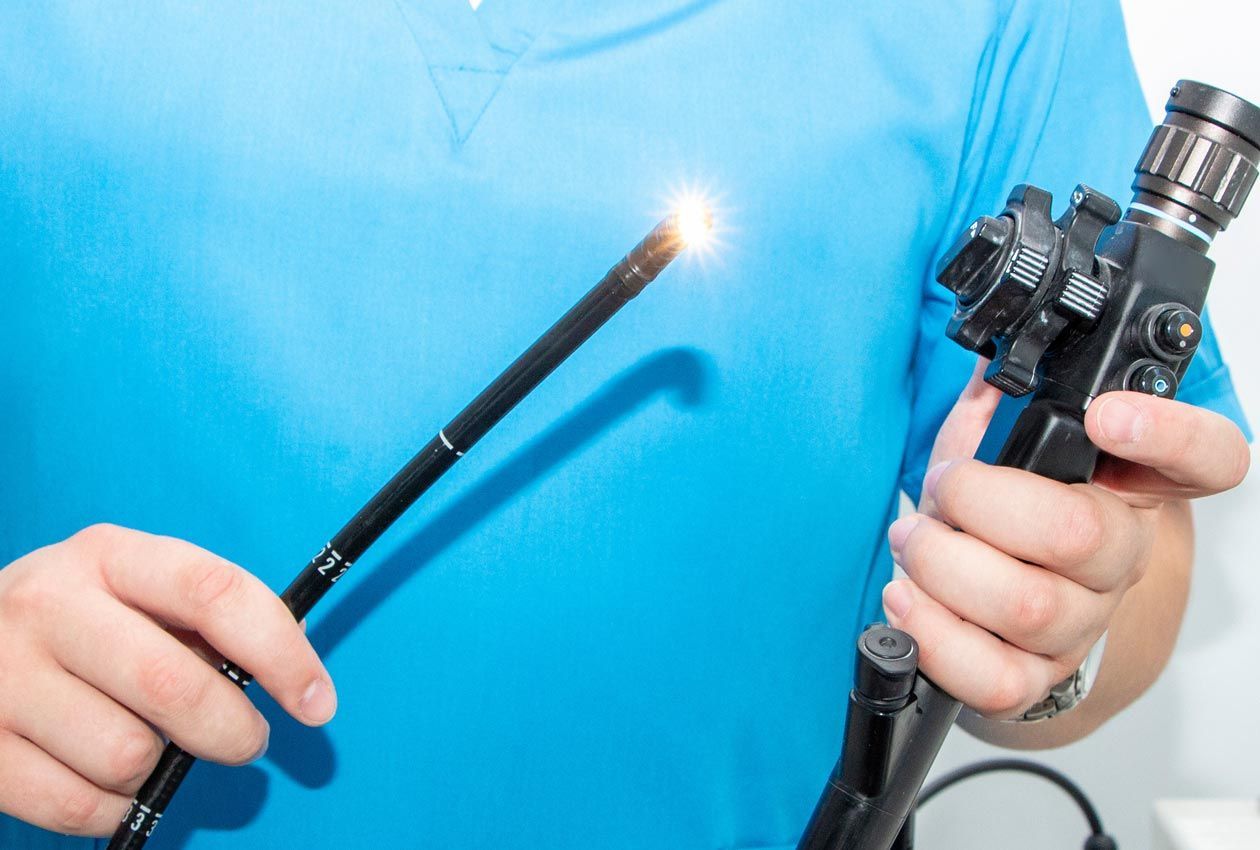Mount Elizabeth Novena Hospital #10-48/49
WHAT IS ENDOSCOPY & GASTROSCOPY?
For individuals seeking to understand their digestive health, endoscopy and gastroscopy stand out as crucial diagnostic tools. These procedures offer valuable insights into the gastrointestinal tract, enabling early identification and intervention when necessary.
WHAT IS ENDOSCOPY?
Endoscopy is a medical procedure that involves using a flexible tube with a light and camera, known as an endoscope, to examine the body's interior. The endoscope allows doctors to evaluate and capture images of the internal organs and structures.
Endoscopy is commonly used to investigate and diagnose various conditions within the digestive system, respiratory system and other hollow organs. The most common type of endoscopy is gastrointestinal endoscopy or gastroscopy, where the endoscope is inserted through the mouth and down the oesophagus into the stomach and the first part of the small intestine.
WHAT SYMPTOMS AND CONDITIONS REQUIRE AN ENDOSCOPY?
Endoscopy may be recommended to investigate various symptoms and conditions, including:
-
Persistent abdominal pain
-
Unexplained weight loss
-
Difficulty swallowing
-
Gastrointestinal bleeding
-
Changes in bowel habits
-
Chronic heartburn or acid reflux
-
Screening for gastrointestinal cancers
WHAT IS GASTROSCOPY?
Gastroscopy, a type of endoscopy, examines the upper gastrointestinal (GI) tract. This examination includes the oesophagus, stomach, and the first part of the small intestine (duodenum). A gastroscopy is used to provide detailed images that aid in diagnosing various gastrointestinal issues.
WHAT SYMPTOMS & CONDITIONS REQUIRE GASTROSCOPY?
Gastroscopy is commonly recommended for individuals experiencing:
- Persistent abdominal pain
- Difficulty swallowing
- Chronic nausea and vomiting
- Gastrointestinal bleeding
- Persistent abdominal bloating and distension
- Heartburn and reflux
- Inflammation or irritation of the oesophagus, stomach, or duodenum
DOES GASTROSCOPY SCREENING DETECT GASTROINTESTINAL CANCER?
Gastroscopy is useful for detecting gastrointestinal cancers located in the upper intestinal tract, especially in their early stages. It allows for visualising abnormal growths or lesions in the upper digestive tract.
IS GASTROSCOPY REQUIRED FOR GASTROINTESTINAL SURGERY?
Gastroscopy is often a prerequisite but necessarily mandatory for certain gastrointestinal surgeries. It helps surgeons assess the condition of the upper digestive tract, plan the surgical approach, and ensure a more accurate diagnosis.
WHAT ARE THE BENEFITS OF GASTROSCOPY?
Both gastroscopy offer several benefits:
-
Early diagnosis
: Detecting conditions in their early stages improves the chances of successful treatment. -
Precision
: Direct visualisation allows for accurate diagnosis and targeted treatment. -
Treatment
: Some therapeutic procedures, such as polyp removal or tissue sampling, can be performed during gastroscopy.
WHO SHOULD UNDERGO GASTROSCOPY?
Individuals experiencing persistent digestive symptoms, unexplained weight loss, or those at higher risk for gastrointestinal cancers due to family history or other factors should consider these procedures.
WHAT FACTORS TO CONSIDER WHEN LOOKING FOR GASTROSCOPY & ENDOSCOPY SERVICES IN SINGAPORE?
When seeking endoscopy and gastroscopy services in Singapore, consider factors such as:
-
Expertise:
Choose a facility with experienced medical professionals, specifically gastrointestinal specialists. -
Facility accreditation:
Look for facilities accredited by relevant health organisations. -
Technology:
Ensure the facility uses modern endoscopic equipment for accurate diagnostics.
WHAT IS THE COST OF GASTROSCOPY IN SINGAPORE?
Gastroscopy costs in Singapore can vary based on the type of endoscopy and any additional procedures required. You should inquire about costs and potential insurance coverage beforehand.
HOW DO I PREPARE FOR A GASTROSCOPY IN SINGAPORE?
Follow the guidelines provided by your doctor closely to ensure a successful procedure. Preparation instructions may include:
- Fasting for a specific period.
- Discontinuing certain medications.
- Informing healthcare providers about allergies or medical conditions.
HOW LONG DO GASTROSCOPY PROCEDURES TAKE?
The duration of these procedures varies but typically lasts between 15 minutes to an hour. The type of examination and any additional interventions required will affect the duration.
WHAT HAPPENS DURING AND AFTER THE PROCEDURE?
Patients undergo sedation for the procedure, and the gastroscope is inserted gently through the mouth. Post-procedure, patients are closely monitored until the effects of sedation diminish. Post-procedure instructions may include restrictions on eating and drinking for a specific period.
WHAT COMPLICATIONS CAN OCCUR AFTER AN ENDOSCOPY & GASTROSCOPY?
While complications are rare, they can include bleeding, infection, or adverse reactions to sedation. Doctors will closely monitor patients during and after the procedure to minimise risks.
ARE THESE PROCEDURES PAINFUL?
Endoscopy and gastroscopy are typically not painful due to the use of sedation. Patients may encounter mild discomfort after the procedure, such as a sore throat.
CALL YOUR ENDOSCOPY AND GASTROSCOPY EXPERT IF:
- You experience severe abdominal pain or persistent bleeding after the procedure.
- You develop a fever with the symptoms or notice signs of infection.
- You have difficulty breathing or chest pain.
GASTROINTESTINAL SPECIALIST IN SINGAPORE
Endoscopy and gastroscopy are invaluable tools for diagnosing and treating gastrointestinal conditions. Understanding the procedures, benefits, and considerations involved can empower you to make informed decisions about your digestive health.
For personalised guidance and advice in Singapore, consult Colorectal Clinic Associates. Our team of
gastrointestinal specialists is committed to patient care and diagnostic techniques to help you better care for your digestive health.




